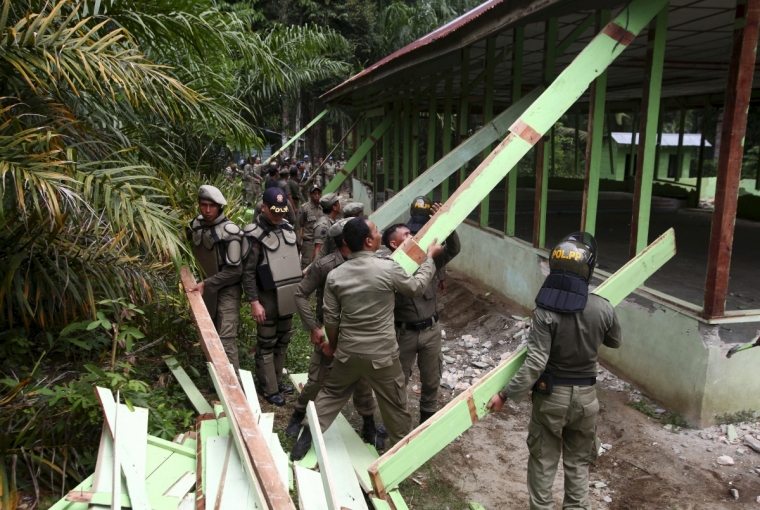1,000 churches shut down in Indonesia since passage of 'religious harmony' law

JAKARTA (Christian Examiner) – Nearly 1,000 Indonesian churches have been closed since the country passed a "religious harmony" law in 2006, the group Evangelical Focus has reported.
Most of the churches, the group said, have faltered in the process of obtaining permits for construction, which can only begin for a church after it has obtained 60 signatures from people of a different faith, as well as permission from local authorities. In most cases, the Muslim majority resists the building of churches and police – generally Muslim – frown on Christian activities.
The law, passed under the guise of protecting civil order, has only made things worse for Christians, Andreas Harsono of Human Rights Watch Asia told Foreign Policy magazine in October. Harsono said the law "triggered the rise of discrimination and violence against religious minorities in Indonesia."
"It shows the failures of the religious harmony regulation," Harsono told the magazine. "It discriminates [against] minorities, thus making way for the majority, mostly Muslim hard-liners in Indonesia, to pressure the government to close down churches. If the government refuses, they will take the discriminatory law into their own hands."
For example, only three churches operate in Banda Aceh, but new churches cannot get permits to build because they lack local support. When Christians protest such conditions, police often respond with violence. That violence, then blamed on Christians, usually results in the destruction of more churches, as it did in Aceh in October.
In August, the World Evangelical Alliance criticized Indonesia's administration, which has reportedly recognized the dangers of Islamic extremism but has done little to check Indonesia's growing number of hardline Islamist clerics.
"When Indonesian President Joko Widodo took office one year ago this month, there were high hopes that his government would check Islamist extremist violence. However, President Jokowi, as he is affectionately known, is yet to prove that he has the ability to meet that expectation," the report from WAE said.
"Jokowi does seem to have the will, as he recognizes that religious extremism is a serious issue, unlike his predecessor Susilo Bangbang Yudhoyono, who neither acknowledged nor did anything to control the growth of extremist groups."
The Gatestone Institute also reported that all 29 churches in the West Java province had been forcibly closed, while imams in Aceh called on Muslims to burn churches with the call, "We will not stop haunting Christians and burning churches. Christians are Allah's enemies."
In its 2015, the U.S. Commission on International Religious Freedom noted in its annual report that local authorities in the province of Aceh passed a measure that strengthened Sharia law, and made the same laws apply to 90,000 non-Muslims (members of religious minority groups, such as Christians) as well as any foreigners visiting the area.
"The bylaw imposes Islamic law on persons of other faiths, establishes new crimes not found in the national criminal code, and potentially forces non-Muslims to be tried in Sharia courts. Some religious minorities have expressed concern that they will be punished under the bylaw for failing to conform to traditional Islamic guidelines, even though those guidelines are not recognized by their own religions. Moreover, the bylaw entrenches Sunni Islam as the official religion in Aceh, thereby imposing Sunni traditions on all Muslims in the province, including Shia Muslims, as well as Ahmadis, overriding their right to practice their faiths freely," the report said.
The passage of the law, the USCIRF said, has coincided with an increasing number of "vigilante attacks" on non-Muslims.